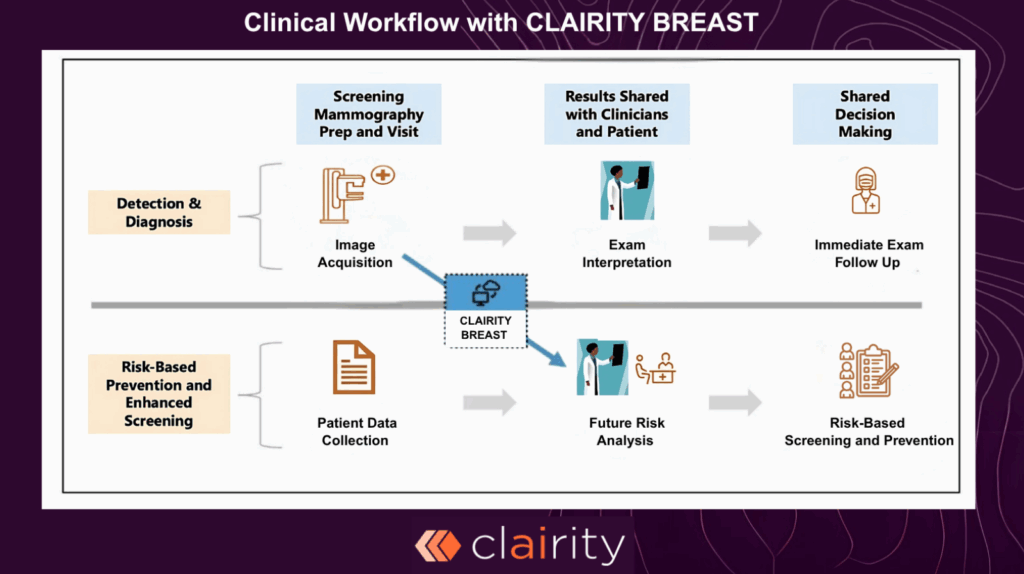The FDA has granted De Novo authorization to Clairity Breast, a pioneering AI platform developed by Clairity, Inc., making it the first device to predict five-year breast cancer risk from a routine screening mammogram. This device brings personalized care by using advanced AI to facilitate proactive risk prediction.
Clairity Breast analyzes subtle imaging features in mammograms, invisible to the human eye, and calculates a five-year risk score for future breast cancer. It does not diagnose cancer or replace the radiologist’s interpretation of images, but provides an early, individualized risk prediction that integrates into existing clinical workflows.
The device is used only after the radiologist has completed their standard review and is meant for patients who have no known breast cancer at the time of screening.
Historically, risk prediction has relied heavily on family history or known genetic mutations, but nearly half of all breast cancers occur in women with no clear risk factors beyond age and sex. In the US, breast cancer remains the most common cancer in women, accounting for about one in three new female cancers each year. In 2025, approximately 316,950 new cases of invasive breast cancer are expected, alongside 59,080 cases of ductal carcinoma in situ (DCIS) and an estimated 42,170 deaths.
Current mammography approaches focus on detecting visible signs of cancer, such as calcifications or masses. While mammograms are highly effective for early detection, they miss about 20% to 30% of cancers present at the time of screening — particularly in dense breast tissue — and over 50% of women screened for 10 years will experience at least one false-positive result, leading to anxiety, extra testing and potentially unnecessary procedures, including overdiagnosis.
Although tools like computer-aided detection (CAD) can increase sensitivity by up to 20%, these advances still only help identify present abnormalities. Predicting future risk from a normal mammogram image has previously not been possible.
Clairity Breast’s approach uncovers patterns that correlate with future risk. This is particularly important because breast cancer incidence rates are rising, with an annual increase of about 1%, steeper still in women younger than 50.
Globally, breast cancer caused an estimated 670,000 deaths in 2022, with significant disparities across regions. While incidence rates are highest in high-income countries, survival rates are lower in low-income regions, where early detection tools are often scarce.
Clairity Breast’s AI model was validated on more than 77,000 mammograms from diverse populations, and its risk predictions can help inform follow-up imaging decisions, such as whether to use MRI, in clinical care.
Clairity plans to introduce Clairity Breast in leading health systems through 2025, with the FDA’s De Novo authorization signaling its role as a first-of-its-kind technology in the $63 billion global breast cancer prediction market.
AI’s Expanding Role in Breast Cancer Detection and Diagnosis
AI is also being explored across different aspects of breast cancer care.
Mindpeak and AstraZeneca are evaluating Mindpeak Breast H&E, an AI tool that helps pathologists analyze stained biopsy slides to diagnose invasive breast cancer and DCIS.
GE HealthCare’s FDA-approved Invenia Automated Breast Ultrasound (ABUS) Premium uses 3D ultrasound imaging with integrated AI to improve cancer detection in dense breast tissue — a challenge for standard mammograms.
Ibex Breast by Ibex Medical Analytics, also FDA-cleared for certain uses, assists pathologists in diagnosing cancer from biopsy samples by distinguishing malignant from benign features, increasing efficiency and confidence in labs worldwide.
While Clairity Breast focuses on predicting future risk from screening mammograms, these other tools apply AI to support diagnosis.
If you want your company to be featured on Xtalks.com, please email [email protected].












Join or login to leave a comment
JOIN LOGIN